- Home
- Leo Tolstoy
War and Peace Page 2
War and Peace Read online
Page 2
Then suddenly in the middle of this political discussion Anna Pavlovna launched forth in great excitement. 'Oh, don't talk to me about Austria!3 Perhaps it's all beyond me, but Austria has never wanted war and she still doesn't want war. She's betraying us. Russia alone must be Europe's saviour. Our benefactor is aware of his exalted calling and he'll live up to it. That's the one thing I do believe in. The noblest role on earth awaits our good and wonderful sovereign, and he is so full of decency and virtue that God will not forsake him. He will do what has to be done and scotch the hydra of revolution, which has become more dreadful than ever in the person of this murdering villain.4 We alone must avenge the blood of the righteous. And whom can we trust, I ask you? England, with that commercial spirit of hers, cannot understand the lofty soul of our Emperor Alexander, and never will. She has refused to evacuate Malta.5 She keeps on looking for an ulterior motive behind our actions. What did they say to Novosiltsev? Nothing. They didn't understand, they're not capable of understanding, how altruistic our Emperor is - he wants nothing for himself but everything for the good of mankind. And what have they promised? Nothing. And what little they have promised, they won't carry out. Prussia has already declared that Bonaparte is invincible and that the whole of Europe is powerless to oppose him . . . I for one don't believe a single word from Hardenberg or Haugwitz. That much-vaunted Prussian neutrality is just a trap. I put my faith in God and the noble calling of our beloved Emperor. He'll be the saviour of Europe!'
She stopped suddenly, amused at her own passionate outburst.
'I think if they had sent you instead of our dear Wintzengerode,'6 said the prince with a similar smile, 'an onslaught like that from you would have got the King of Prussia to agree. You are so eloquent. May I have some tea?'
'Yes, of course. By the way,' she added, calming down, 'there are two very interesting men coming here tonight - the Vicomte de Mortemart, a Montmorency through the Rohan line, one of the best French families. He's the right kind of emigre, one of the genuine ones. And the Abbe Morio - such a profound thinker. Do you know him? He's been received by the Emperor. Have you heard?'
'Oh, it will be a pleasure to meet them,' said the prince. 'But tell me,' he added, with studied nonchalance, as if an idea had just occurred to him, though this question was the main reason for his visit, 'is it true that the Dowager Empress wants Baron Funke to become First Secretary in Vienna? They do say he's a miserable creature, that baron.'
Prince Vasily wanted this post for his son, but other people were working through the Empress Maria Fyodorovna to get it for the baron. Anna Pavlovna half-closed her eyes to indicate that neither she nor anyone else could pass judgement on what the Empress might feel like doing or want to do. 'Baron Funke has been recommended to the Dowager Empress by her sister,' was all she said, in a dry, lugubrious tone. As she pronounced the name of the Empress, Anna Pavlovna's face took on an expression of profound and sincere devotion mixed with respect and tinged with sadness, which invariably came upon her when she had occasion to mention her exalted patroness. She said that her Majesty had been gracious enough to show Baron Funke great respect, at which her face once again dissolved into sadness.
The prince said nothing and showed no feeling. Anna Pavlovna, with all the sensitivity and quick thinking of both a courtier and a woman, decided to rebuke the prince for daring to refer in such a way to a person recommended to the Empress, and at the same time to console him. 'But, on the subject of your family,' she said, 'do you realize how much your daughter has delighted everyone in society since she came out? They say she's as beautiful as the day is long.'
The prince bowed as a mark of his gratitude and respect.
'I often think,' Anna Pavlovna resumed after a short pause, edging closer to the prince and smiling sweetly to indicate that the political and social conversation was now at an end, and personal conversation was in order, 'I often think that good fortune in life is sometimes distributed most unfairly. Why has fate given you two such splendid children? I don't include Anatole, your youngest - I don't like him,' she commented in a peremptory tone and with raised eyebrows. 'Such charming children. And I must say you seem to appreciate them less than anyone. You really don't deserve them.'
And she smiled her exuberant smile.
'What can I do? Lavater would have said that I have no paternity bump,'7 said the prince.
'Oh, do stop joking. I wanted a serious talk with you. Listen, I'm not pleased with your younger son. Just between ourselves,' her face went all gloomy again, 'his name has been mentioned in her Majesty's presence, and people are feeling sorry for you . . .'
The prince said nothing, while she gave him a knowing look, waiting in silence for his reply. Prince Vasily frowned.
'What can I do?' he said at last. 'You know I've done everything a father could do to bring them up well, and they have both turned out to be idiots. At least Hippolyte's a fool on the quiet - Anatole's the rowdy one. That's the only difference between them,' he said, with an unusually awkward and forced smile, which gave a sharp twist to the lines round his mouth, making it surprisingly ugly and coarse.
'Why do men like you have children? If you weren't a father, I could find no fault with you,' said Anna Pavlovna, looking up pensively.
'I'm your faithful slave. I wouldn't admit it to anyone else, but my children are the bane of my life. They're the cross I have to bear. That's how I explain it to myself. What would you . . . ?' He broke off with a gesture that signalled his resignation to a cruel fate. Anna Pavlovna thought things over.
'That prodigal son of yours, Anatole, haven't you thought of marrying him off? They do say,' she went on, 'that old maids have a mania for matchmaking. So far I've never been conscious of this failing in myself, but I do have a certain little person in my mind, someone who is very unhappy with her father - a relative of ours, the young Princess Bolkonsky.'
Prince Vasily made no reply, but being quick on the uptake and good at remembering things - qualities that came naturally to the denizens of high society - he gave a slight nod to show that he had noted her comment and was considering it.
'No, listen, do you realize that boy's costing me forty thousand roubles a year?' he said, obviously unable to check the dismal drift of his thinking. He paused. 'What will it be like in five years' time if he carries on like this? You see what the benefits of fatherhood are . . . This princess of yours, is she rich?'
'Her father's a very rich man and a miser. He lives out in the country. You know, Prince Bolkonsky. He's very well known. He retired under the late Emperor. They used to call him the "the King of Prussia". He's a very clever man, but he's a crank, not easy to get on with. Poor little thing, she's as miserable as any girl could be. It was her brother who married Liza Meinen not too long ago. He's one of Kutuzov's adjutants. He's coming here tonight.'
'Listen, my dear Annette,' said the prince, suddenly taking his companion's hand and pressing it downwards for reasons best known to himself. 'You set this up for me, and I'll serve you like a faithful slave for ever. (Or slafe, with an 'f', as my village elder puts it when he writes to me.) She's a girl from a good family, and she's rich. That's all I need.'
And with the freedom, familiarity and sheer style that were his hallmark, he took hold of the maid of honour's hand, kissed it and gave it a little shake, easing back into his armchair and looking away from her.
'Wait a minute,' said Anna Pavlovna, thinking things over. 'I'll have a little talk with Lise, young Bolkonsky's wife, this very evening. Perhaps something can be arranged. I'll use your family to start learning the old maid's trade.'
CHAPTER 2
Anna Pavlovna's drawing-room was steadily filling up. All the important people in St Petersburg society were there, varying enormously in age and character for all their shared social background. Prince Vasily's daughter, the beautiful Helene, had just arrived to take him on to the Ambassador's reception; she was wearing a ballgown enhanced by a maid of honour's monogram. The young Princess Bolkon
sky, a slip of a girl known as the most seductive woman in Petersburg, was there too; married the previous winter, she no longer appeared at large occasions because she was pregnant, but she did still attend small soirees. Prince Vasily's son, Prince Hippolyte, arrived with Mortemart, and introduced him. Also present were the Abbe Morio and many other people.
Anna Pavlovna was welcoming her guests as they arrived with a 'Have you met my aunt?' or 'I don't think you know my aunt' before steering them with great solemnity towards a little old lady with big bows in her hair, who had come sailing in from the next room as soon as the guests had begun to arrive. Anna Pavlovna would announce them by name, slowly transferring her gaze from guest to aunt, and then move on. All the guests went through the motions of greeting this aunt, who was unknown, uninteresting and unneeded by anyone. Anna Pavlovna observed their greetings with sadness and solemn sympathy, a picture of silent approval. The lady known as 'my aunt' spoke in the same way to every new arrival, commenting on their health, her own health and the health of her Majesty, who was by now, thank God, feeling better. All those who approached were polite enough to refrain from showing undue haste, but once this onerous duty had been fulfilled they walked away from the old lady with a sense of relief, and never went near her again all evening.
Young Princess Bolkonsky had brought some work with her in a gold-embroidered velvet bag. Her pretty little upper lip, slightly shadowed with down, barely covered her teeth, but that made it all the prettier when it rose up and lovelier still when it curled down to meet the lower lip. As tends to happen with the best-looking women, a defect - in this case a short lip and a half-open mouth - came out as a distinctive and beautiful feature. Everyone enjoyed the sight of this pretty little mother-to-be, brimming with health and vitality and making light of her condition. After a few minutes in her company and the exchange of a word or two, old men and bored, morose young men felt as if they themselves were becoming like her. Anyone who talked to her, watching her as every word she spoke revealed that bright little smile and the constant gleam of those dazzling white teeth, walked away feeling full of bonhomie. Everybody did.
The little princess waddled slightly as she tripped rapidly round the table, holding her tiny workbag, then she cheerfully smoothed down her dress and sat on a sofa near the silver samovar. Everything she did seemed like a treat for herself and everyone around her.
'I've brought my work,' she said in French, opening her reticule and addressing all the company. 'But listen, Annette, you must stop playing tricks on me,' she said, turning to the hostess. 'You wrote and said it was only a little party. Just look what I've got on.' And she spread her arms wide to display an elegant grey dress, decorated with lace and set off by a broad sash just below the bosom.
'Don't worry, Lise, you'll always be the prettiest,' answered Anna Pavlovna.
'Did you know my husband is deserting me?' she said to a general, continuing to speak French and using just the same tone. 'He's going off to get himself killed. Do tell me what this awful war is all about,' she asked of Prince Vasily, but before he could answer she had moved on to his daughter, the beautiful Helene.
'Isn't she a gorgeous creature, this little princess?' said Prince Vasily to Anna Pavlovna.
Shortly after the little princess's arrival, in walked a big, generously proportioned young man with close-cropped hair and spectacles, wearing the last word in light-coloured breeches and a tan coat with a jabot. This stout young man was the illegitimate son of a celebrated grandee from Catherine's age, old Count Bezukhov, who was now on his deathbed in Moscow. He had not yet entered any branch of the service, having only just returned from abroad, where he had been completing his education. This was his first appearance in society. Anna Pavlovna welcomed him with the kind of bow she reserved for the lowest persons in the hierarchy of her drawing-room. But even as she bestowed her meanest welcome on this new arrival Anna Pavlovna's face was transformed; she looked ill at ease and full of alarm, like someone who had come across some gross object, oversized and out of place. By a small margin Pierre was indeed the largest man in the room, but her look of dismay must surely have derived from this man's special look - intelligent, rather diffident, but also piercing and spontaneous - that made him a distinctive figure in the drawing-room.
'It is most kind of you, Monsieur Pierre, to come to see a poor sick woman,' said Anna Pavlovna, looking anxiously across at her aunt as she steered him in her direction. Pierre mumbled something unintelligible, and continued to stare around the room, looking for something. He beamed with pleasure, bowed to the little princess as if she was a close friend of his, and then went over to the aunt. Anna Pavlovna's worst fears were confirmed when Pierre walked off without hearing the full story of her Majesty's health. Rattled, Anna Pavlovna detained him with a question.
'You don't know the Abbe Morio, do you? Such an interesting man . . .'
'Yes, I've heard about him and his scheme for everlasting peace. All very interesting, but not really feasible.'
'Don't you think so?' asked Anna Pavlovna for the sake of saying something before getting back to her duties as hostess, but Pierre now committed the opposite kind of faux pas. Fresh from walking away without listening properly to a lady who was speaking to him, he now talked on and detained a lady who needed to get away from him. With his head lowered and his great legs thrust wide apart, he set about explaining to Anna Pavlovna why he thought the abbe's scheme was a silly fancy.
'Could we talk about this later on?' smiled Anna Pavlovna.
Detaching herself from this young man who had no idea how to conduct himself, she resumed her duties as hostess, watching and listening carefully, ready to render assistance at any point where the conversation was beginning to flag. Just as the foreman of a spinning-mill settles the workers down and then strolls about the place on the lookout for a breakdown or any funny noise from a spindle, the slightest squeak or knock that would bring him rushing over to ease the machinery or make an adjustment, so Anna Pavlovna patrolled her drawing-room, walking over to any group where the talk was too little or too loud, and easing the machinery of conversation back into its proper, steady hum with a single word here or a tiny manoeuvre there. But busy as she was with all these preoccupations, she was still clearly worried about Pierre. She watched him anxiously as he went over to hear what was being said in Mortemart's circle, and then set off for a different group where the abbe was holding forth.
Pierre had been educated abroad, and this evening party at Anna Pavlovna's was his first such occasion in Russia. Knowing that all the intelligentsia of Petersburg was gathered here, he was like a child in a toyshop, his eyes darting about everywhere. He was afraid of missing any intellectual talk that might have been his to hear. As he gazed at the assembled company, their faces pictures of refinement and self-confidence, he was expecting to hear something very clever at any moment. Eventually he came over to Morio. The conversation struck him as interesting, so he stood there waiting for a chance to launch forth with his own ideas, as young people are wont to do.
CHAPTER 3
Anna Pavlovna's soiree was now in full swing. On all sides the spindles were humming away non-stop. Apart from the aunt, and her sole companion, an elderly lady with a thin, careworn face, who seemed rather out of place in this brilliant society, the company had split into three groups. The one with most men in it centred around the abbe; another group, of younger people, was dominated by the beautiful Princess Helene, Prince Vasily's daughter, and the pretty little Princess Bolkonsky, with her blushing features and a figure too full for her young age. Mortemart and Anna Pavlovna formed part of the third group.
The viscount was a pleasant-looking young man with gentle features and manners, obviously full of his own importance, but modest enough, because of his good breeding, to indulge any company that he might find himself in. Anna Pavlovna was clearly showing him off to her guests. Just as a skilful head waiter can pass off as a supreme delicacy a cut of beef that would be inedible if you'd s
een it in the filthy kitchen, Anna Pavlovna served up to her guests that evening first the viscount and then the abbe as if they were supreme delicacies. In Mortemart's group the conversation had turned to the execution of the Duke of Enghien.8 The viscount held that the duke had perished through his own magnanimity, and there were special reasons behind Bonaparte's animosity towards him.
'Oh, I say! Do tell us all about it, Viscount,' said Anna Pavlovna, delighted to feel she had insinuated a touch of Louis XV9 in the old-fashioned French phrase she had used. The viscount gave a polite bow and a willing smile. Anna Pavlovna brought them into a circle around him and beckoned everyone over to hear his story.
'The viscount was a personal friend of the duke,' she whispered to one of them, and murmured to someone else, 'The viscount is such a good raconteur.' To a third person she said, 'You see - what a man of quality!', and the viscount was presented in the most refined and advantageous light, served up like a joint of beef garnished with salad on a hot platter.
The viscount was preparing to launch forth; his smile was subtle.
'My dear Helene, do come over here,' said Anna Pavlovna to the gorgeous princess sitting in the very centre of the other group a little way off.
Princess Helene rose with a smile, the same unchanging beautiful woman's smile with which she had entered the room. With a gentle rustle of her white ballgown trimmed with ivy and moss, with her glistening white shoulders, glossy hair and sparkling diamonds, she moved between the men as they stepped aside to make way for her. Without looking anyone in the face, but beaming at the company in general and apparently bestowing permission for everyone to admire her wonderful figure, her full shoulders and her fashionably exposed bosom and back, she glided up to Anna Pavlovna, and the brilliance of the ballroom seemed to come with her. Helene was so exquisite that she not only avoided the slightest hint of flirtatiousness, she even seemed to be embarrassed by the all-too-evident, truly devastating beauty that was hers. It was as if she wanted to tone down the effect of her beauty, but couldn't do so.

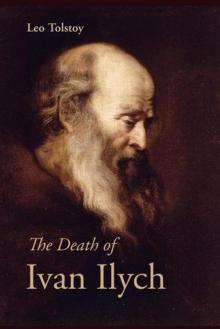 The Death of Ivan Ilych
The Death of Ivan Ilych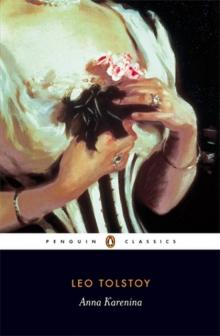 Anna Karenina
Anna Karenina Resurrection
Resurrection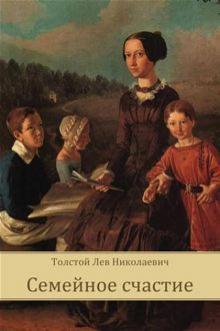 Family Happiness
Family Happiness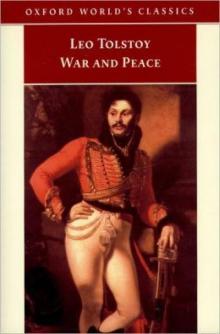 War and Peace
War and Peace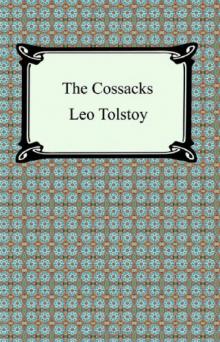 The Cossacks
The Cossacks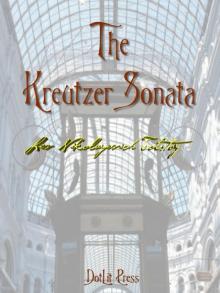 The Kreutzer Sonata
The Kreutzer Sonata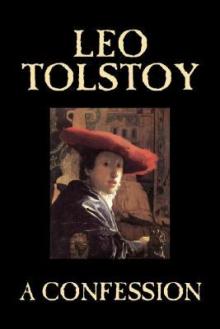 A Confession
A Confession The Kingdom of God Is Within You
The Kingdom of God Is Within You Father Sergius
Father Sergius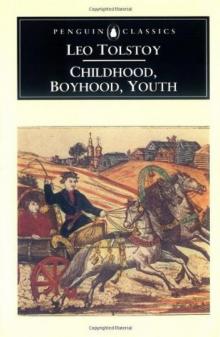 Childhood, Boyhood, Youth
Childhood, Boyhood, Youth Lives and Deaths
Lives and Deaths The Devil
The Devil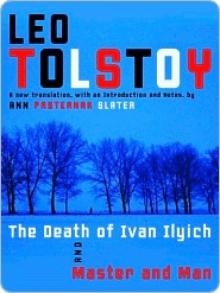 The Death of Ivan Ilyich and Master and Man
The Death of Ivan Ilyich and Master and Man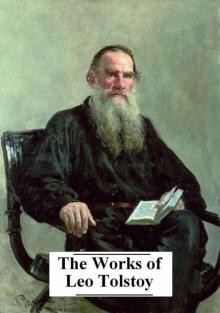 The Complete Works of Leo Tolstoy (25+ Works with active table of contents)
The Complete Works of Leo Tolstoy (25+ Works with active table of contents)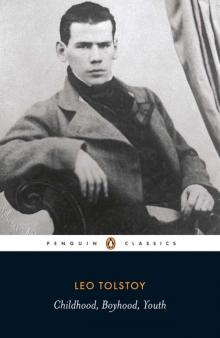 Childhood, Boyhood, Youth (Penguin ed.)
Childhood, Boyhood, Youth (Penguin ed.)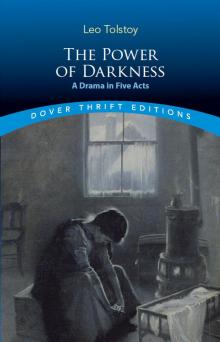 The Power of Darkness
The Power of Darkness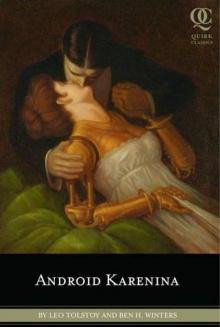 Android Karenina
Android Karenina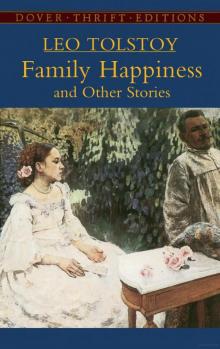 Family Happiness and Other Stories
Family Happiness and Other Stories The Lion and the Puppy
The Lion and the Puppy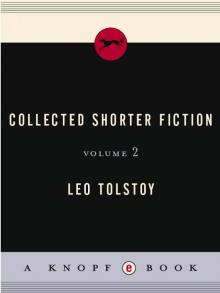 Collected Shorter Fiction, Volume 2
Collected Shorter Fiction, Volume 2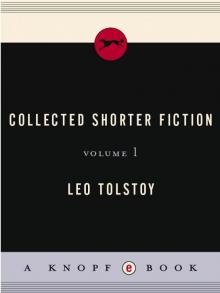 Collected Shorter Fiction, Volume 1
Collected Shorter Fiction, Volume 1